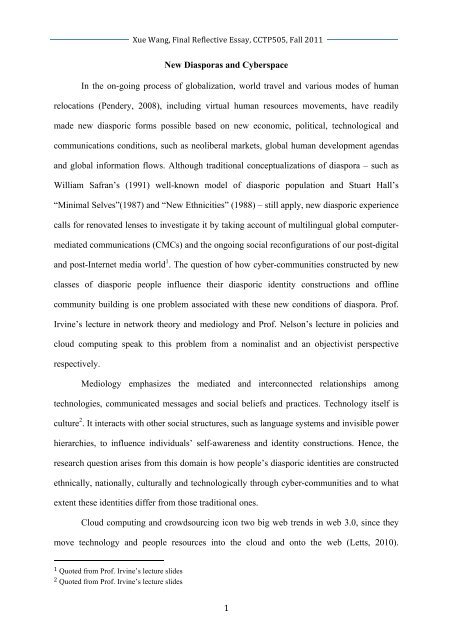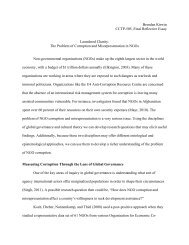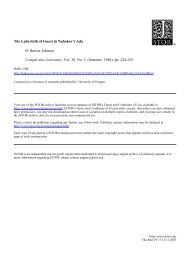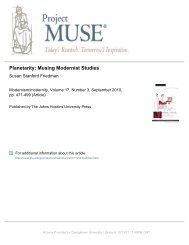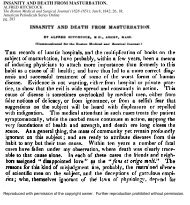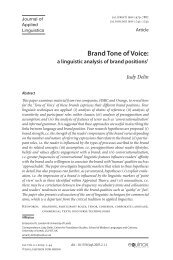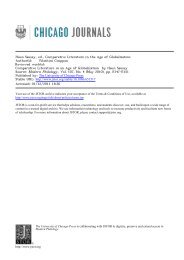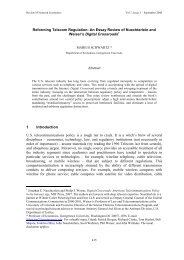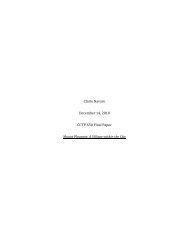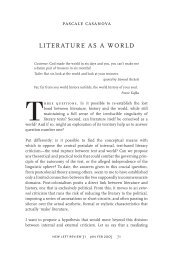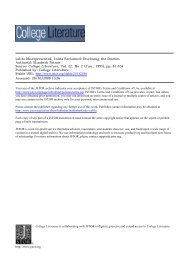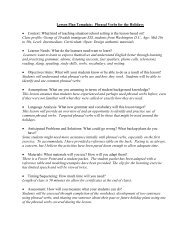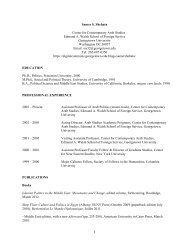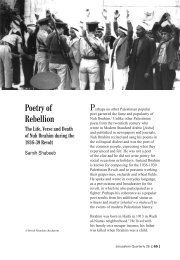Xue Wang-Final Reflection Paper
Xue Wang-Final Reflection Paper
Xue Wang-Final Reflection Paper
You also want an ePaper? Increase the reach of your titles
YUMPU automatically turns print PDFs into web optimized ePapers that Google loves.
<strong>Xue</strong> <strong>Wang</strong>, <strong>Final</strong> Reflective Essay, CCTP505, Fall 2011 <br />
New Diasporas and Cyberspace<br />
In the on-going process of globalization, world travel and various modes of human<br />
relocations (Pendery, 2008), including virtual human resources movements, have readily<br />
made new diasporic forms possible based on new economic, political, technological and<br />
communications conditions, such as neoliberal markets, global human development agendas<br />
and global information flows. Although traditional conceptualizations of diaspora – such as<br />
William Safran’s (1991) well-known model of diasporic population and Stuart Hall’s<br />
“Minimal Selves”(1987) and “New Ethnicities” (1988) – still apply, new diasporic experience<br />
calls for renovated lenses to investigate it by taking account of multilingual global computermediated<br />
communications (CMCs) and the ongoing social reconfigurations of our post-digital<br />
and post-Internet media world 1 . The question of how cyber-communities constructed by new<br />
classes of diasporic people influence their diasporic identity constructions and offline<br />
community building is one problem associated with these new conditions of diaspora. Prof.<br />
Irvine’s lecture in network theory and mediology and Prof. Nelson’s lecture in policies and<br />
cloud computing speak to this problem from a nominalist and an objectivist perspective<br />
respectively.<br />
Mediology emphasizes the mediated and interconnected relationships among<br />
technologies, communicated messages and social beliefs and practices. Technology itself is<br />
culture 2 . It interacts with other social structures, such as language systems and invisible power<br />
hierarchies, to influence individuals’ self-awareness and identity constructions. Hence, the<br />
research question arises from this domain is how people’s diasporic identities are constructed<br />
ethnically, nationally, culturally and technologically through cyber-communities and to what<br />
extent these identities differ from those traditional ones.<br />
Cloud computing and crowdsourcing icon two big web trends in web 3.0, since they<br />
move technology and people resources into the cloud and onto the web (Letts, 2010).<br />
1 Quoted from Prof. Irvine’s lecture slides<br />
2 Quoted from Prof. Irvine’s lecture slides <br />
1
<strong>Xue</strong> <strong>Wang</strong>, <strong>Final</strong> Reflective Essay, CCTP505, Fall 2011 <br />
Government policies could either hinder or foster these trends. Similarly, the government<br />
policies in diasporic people’s host countries on immigration, intellectual properties and<br />
technical infrastructures will also influence the organizational and collaborative models of<br />
diasporic online communities. Therefore, the research question specific to this area is how the<br />
notions of cloud computing and crowdsourcing and their related policies influence the<br />
operating structures and models of these virtual communities and thus add new dimensions to<br />
these people’s offline diasporic experiences.<br />
In order to research how cyber diasporic communities impacts their participants’<br />
identities and real-life community buildings in new diasporic conditions by seeking answers<br />
to the above two questions, I will examine two virtual communities formed by new Chinese<br />
immigrants in U.S. and Singapore, because these two countries represent the most popular<br />
immigrant destinations for Chinese in the Western and Eastern world respectively. The<br />
majorities of both virtual communities are well-educated overseas Chinese students, scholars<br />
and professionals, who are greatly different from those semi-literal early Chinese emigrants.<br />
With regard to my research methods, I will conduct critical discourse analyses of computermediated<br />
communications within these virtual communities, in-depth face-to-face interviews,<br />
participant observations and broad PEST 3 researches. Among these methods, online critical<br />
discourse analyses, which seek to reveal social and political ideologies and power relations in<br />
online discourses, speak particularly to the mediological approach. While broad PEST<br />
researches, which examines macro-environmental factors affecting the online communities’<br />
activities, echo the influences of cloud computing and crowdsourcing and their related<br />
policies. Except for these two methods, the assumptions associated with the mediology and<br />
cloud computing could all exert an effect on how in-depth interviews and participant<br />
observations are conducted. For example, from a mediological perspective, the analyses of<br />
interview results may focus more on linguistic features of what interviewees said; while from<br />
3 Political, Economic, Social and Technological analysis<br />
2
<strong>Xue</strong> <strong>Wang</strong>, <strong>Final</strong> Reflective Essay, CCTP505, Fall 2011 <br />
an objectivist cloud computing perspective, more attentions might be paid to what contents<br />
expressed by the interviewees reflect the ideas of cloud computing and mass collaborations<br />
highlighted by crowdsourcing.<br />
Using the mediological approach to research the first question, we may find that<br />
virtual communities by linking traditional diaporic social systems into computer-mediated<br />
milieus might redistribute semiotic resources and reformulate power relationships among<br />
newly diasporic people and between them and their host societies. Using more objective<br />
research methods to investigate the second question from the cloud computing and<br />
crowdsourcing perspectives, we may find that the notion of cloud computing might heavily<br />
influence how these communities are technologically organized, that the idea of<br />
crowdsourcing could lead to the mass collaborative nature of the interactions within these<br />
communities both online and offline, and that some related government policies may forbid<br />
these diasporic people’s compatriots back in their home countries to access or contribute to<br />
these communities’ online services. Although these two approaches offer unique insights into<br />
the problem, they both have their shortcomings. On the one hand, the mediological approach<br />
may risk the researchers’ biases since how to uncover the invisible networks of institutions<br />
and how to interpret the internal logics of various underlying meaning systems are largely<br />
depended on the researchers’ own knowledge systems. To get interviewees’/research subjects’<br />
meta-pragmatic comments, to ask the same question, or to conduct the same analysis in<br />
various ways may be some strategies to reduce researchers’ biases. On the other hand, the<br />
practical technology and policy research may exaggerate the power of cloud computing and<br />
crowdsourcing in shaping human’s behaviors; overlook the complexity of interdependence of<br />
different forces which bring about clouding computing and crowdsourcing; and attribute<br />
inappropriate agencies to these 3 rd -phase internet technologies. These two approaches –<br />
though not comprehensive by themselves – combined could offer additional angles to see how<br />
new diasporic experiences are constructed in cyberspace and, in turn, affect those offline<br />
activities.<br />
3
<strong>Xue</strong> <strong>Wang</strong>, <strong>Final</strong> Reflective Essay, CCTP505, Fall 2011 <br />
References<br />
Hall, S. (1987). Minimal Selves. In Identity: The Real Me. ICA Document 6 (1987): 44<br />
Hall, S. (1988). New Ethnicities. ICA Documents 7: 27-31<br />
Letts, P. (2010, May 23). Cloud Computing and Crowdsourcing Drive Web 3.0. [Online].<br />
Retrieved November 13, 2011 from the Blur Group website<br />
http://www.blurgroup.com/blog/cloud-computing-and-crowdsourcing-drive-web-3-0<br />
Pendery, D. (2008). Identity Development and Cultural Production in the Chinese Diaspora to<br />
the United States, 1850-2004: New Perspectives. Asian Ethnicity. Vol. 9, No. 3,<br />
October 2008, 201-218.<br />
Safran, W. (1991). Diasporas in Modern Societies: Myths of Homeland and Return. Diaspora<br />
1, no. 1, 83–9.<br />
4


